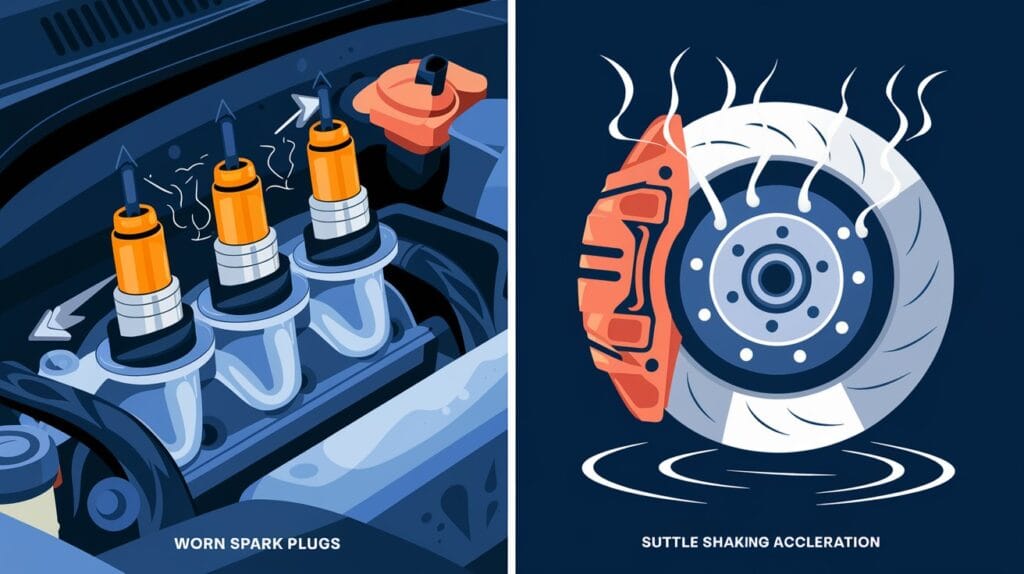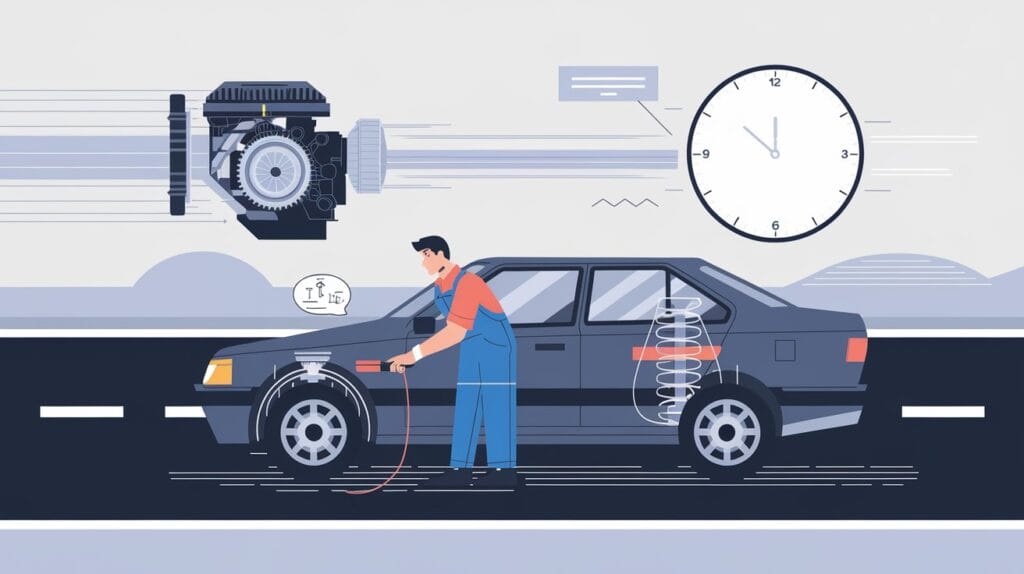Have you ever found yourself gripping the steering wheel as your car starts to shake when you accelerate? It’s an unsettling feeling, and it often raises immediate concerns about your vehicle’s condition. Whether it’s a minor vibration or a violent shake, it’s essential to understand why your car is shaking when you accelerate. This issue can range from simple problems like unbalanced tires to more serious mechanical issues that could cause long-term damage. The key is to identify the root cause and address it promptly.
In this article, we’ll walk you through the most common reasons your car may shake while accelerating, how to identify the problem, and how to fix it before it becomes a bigger more expensive issue.
1. Common Causes of Car Shaking When Accelerating
| Cause | Symptoms | Potential Consequences | Recommended Action |
|---|---|---|---|
| Damaged CV Joint | Vibration under hard acceleration, especially at low speeds | Violent shaking, axle failure if not fixed | Inspect and replace the CV joint |
| Broken Motor Mounts | Excessive vibration when idling or accelerating | Misalignment of engine, further engine damage | Replace motor mounts to restore stability |
| Unbalanced Tires | Shaking worsens at higher speeds | Unsafe driving, tire wear | Rebalance tires, check for missing weights |
| Loose Lug Nuts | Shaking during acceleration, wheel wobble | Potential loss of wheel, serious safety risk | Tighten lug nuts to manufacturer specs |
| Stuck Brake Caliper | Vibration felt through steering wheel, burning smell when stopping | Uneven brake wear, reduced braking efficiency | Inspect and clean the brake system, replace parts if needed |
| Worn Wheel Bearing | Vibration during acceleration, worsening at higher speeds | Increased wear on other suspension components, wheel damage | Replace damaged wheel bearing |
| Bent Axle | Shaking only when accelerating, most noticeable between 35-50 mph | Severe shaking at higher speeds, possible axle failure | Inspect axle for damage, replace if necessary |
Uneven Tires or Tire Imbalance
Tires that are unbalanced or unevenly worn are often the culprits when your car shakes while accelerating. New tires that have been improperly balanced can also lead to vibrations. Tires can develop uneven wear due to misalignment, improper tire pressure, or simply driving on rough roads over time.
When a tire is unbalanced, it doesn’t rotate smoothly, leading to vibrations, especially at higher speeds. These vibrations are more noticeable when you accelerate because the force exerted on the tires is greater, magnifying the imbalance.
How to identify:
- You’ll usually feel the shaking through the steering wheel at higher speeds, especially when accelerating. It’s a strong sign that your tires may be out of balance.
- Uneven tire wear can also be a sign that something isn’t quite right. Check for visible signs like bald spots or irregular tread patterns.
Solution: If you suspect your tires are unbalanced, the first step is to visit a tire shop for a rebalancing. If your tires are unevenly worn, it may be time to replace them.
Worn or Damaged CV Joints
One of the most common reasons for a car shaking when accelerating, especially in front-wheel-drive (FWD) vehicles, is damaged or worn CV (constant velocity) joints. These joints transfer power from the engine to the wheels. When they wear out, they lose their ability to rotate smoothly, causing your car to vibrate during acceleration.Typically, the inner CV joint wears out first due to a tear in the rubber boot, which allows dirt and moisture to enter, contaminating the grease inside. Without proper lubrication, the joint wears out prematurely, leading to vibrations.
How to identify:
- You may notice vibrations under hard acceleration, especially when you press the gas pedal after starting from a stop or when taking off at low speeds.
- The vibrations worsen as the CV joint deteriorates further, sometimes turning into violent shaking under load.
Solution: The only way to fix a worn or damaged CV joint is to replace it. This may require professional help to inspect the joint, as it’s not always easy to spot just by visual inspection.
Broken or Worn Motor Mounts
Motor mounts are crucial parts that fasten the engine to the vehicle’s frame. They help reduce the vibrations that the engine creates while running. If a motor mount breaks or becomes worn out, you’ll feel excess vibrations while accelerating, especially when the engine works harder, such as during rapid acceleration or climbing a hill.
How to identify:
- When the motor mount is broken or damaged, you may notice more intense vibrations when idling, but the shaking is more pronounced during acceleration.
- If your car’s engine sounds rougher than usual, or you notice misalignment in the engine, a bad motor mount could be the problem.
Solution: Replacing the damaged motor mount is the only way to resolve this issue. Sometimes, multiple mounts may be affected, so it’s important to check them all.
Loose or Unbalanced Wheel Bearings
Wheel bearings help your car’s wheels rotate smoothly. If a bearing becomes loose or worn, it can cause the wheel to wobble, leading to noticeable vibrations. This issue is particularly common at higher speeds but can also be noticeable during acceleration.
How to identify:
- If the wheel bearing is damaged, you might hear a grinding or squealing noise when driving.
- The vibration may increase in intensity as you drive faster or when the car accelerates, especially when turning.
Solution: If you suspect a problem with your wheel bearings, it’s crucial to have them checked and replaced by a professional mechanic. Continuing to drive with damaged bearings can lead to further damage to the wheel hub.
Damaged or Bent Axle
A damaged axle, often caused by a collision or impact with a pothole, can lead to noticeable shaking when accelerating. A bent axle will cause the wheels to wobble, leading to vibrations that worsen as the car accelerates.
How to identify:
- Bent axles typically cause shaking that is most noticeable at certain speeds, especially when accelerating.
- You may also notice a pulling sensation or uneven handling if the axle is severely damaged.
Solution: Axle damage requires immediate attention. A mechanic will need to inspect the axle and replace it if necessary. Driving with a damaged axle is dangerous and can cause further damage to the vehicle.
2. Less Common Causes of Car Shaking When Accelerating

Worn Spark Plugs
While less common, worn-out spark plugs can cause your car to shake when accelerating. Spark plugs are vital for igniting the air-fuel mixture in the engine. If they wear out or malfunction, the engine may misfire, causing vibrations.
How to identify:
- The car may shake during acceleration, and you might notice rough idling, poor fuel efficiency, or difficulty starting the car.
- Misfires usually happen when the car is under load (during acceleration or high speeds).
Solution: Replacing the spark plugs is a simple fix. It’s essential to replace spark plugs regularly, as they wear out over time and can affect engine performance.
Stuck Brake Calipers
In rare cases, stuck brake calipers can cause shaking, especially when accelerating at certain speeds. This typically happens when the caliper doesn’t fully release the brake pads, causing them to drag on the brake rotor while driving. This extra friction can create vibrations that are most noticeable when accelerating.
How to identify:
- A burning smell, usually caused by excessive heat in the brake system, is a key sign of a stuck caliper.
- The steering wheel might shake, particularly at higher speeds.
Solution: If you suspect that your brake calipers are stuck, it’s important to have them inspected and repaired immediately. A stuck caliper can lead to uneven brake wear and potentially more severe brake system damage.
3. How to Fix Car Shaking Issues?
DIY or Professional Help?
For issues like unbalanced tires or worn spark plugs, DIY fixes are often possible. However, more complex issues like CV joint failure, broken motor mounts, or wheel bearing damage require professional assistance. If you’re unsure about the cause of the shaking or how to fix it, it’s best to consult with a mechanic.
DIY Fixes:
- Tire balancing and tire rotation
- Replacing spark plugs
- Checking for loose lug nuts
Professional Repairs:
- CV joint replacement
- Motor mount replacement
- Wheel bearing and axle inspections
Regular Maintenance is Key
The best way to avoid car shaking when accelerating is by keeping up with regular maintenance. Routine tire checks, suspension maintenance, and periodic inspections of your car’s axles and CV joints can help you catch small issues before they turn into costly repairs.
4. How Much Will It Cost to Fix Your Car’s Shaking?
The cost to fix a car that shakes during acceleration depends on the issue at hand:
- CV Joint Replacement: $300 – $700
- Motor Mount Replacement: $200 – $600
- Tire Balancing: $50 – $150
- Wheel Bearing Replacement: $200 – $820
- Axle Replacement: $300 – $1,000
The price can vary depending on the make and model of your car, as well as the specific issue that needs attention. It’s always a good idea to get multiple quotes from different mechanics to ensure you’re getting a fair price.
5. Why You Shouldn’t Ignore Car Shaking When Accelerating

Shaking or vibration during acceleration is not just an inconvenience—it’s often a sign of an underlying problem that can lead to bigger issues if left untreated. Continuing to drive with a vibrating car can lead to more damage to the engine, transmission, or suspension, potentially leading to much higher repair costs in the future.
If your car shakes when you accelerate, it’s important to have it checked by a professional as soon as possible. Early diagnosis and repair can save you from more costly and extensive damage down the road.
Conclusion
Car shaking when you accelerate can be caused by a variety of issues, ranging from minor problems like tire imbalance to more serious mechanical failures like CV joint or motor mount damage. The key is to identify the cause quickly and take action to fix the issue before it worsens.
By staying on top of regular maintenance and addressing potential problems early, you can keep your car running smoothly and avoid those unsettling shakes while driving. If you’re unsure about what’s causing your car to shake, it’s always a good idea to consult a professional mechanic. Don’t wait until the problem gets worse—take action today to ensure your safety on the road.
FAQs
Yes, poor wheel alignment can cause vibrations in the car, especially when accelerating. Misaligned wheels cause uneven tire wear and put extra strain on the suspension, which may lead to shaking. If your car is pulling to one side, or if the shaking worsens after driving for a while, getting an alignment check could solve the problem.
Low engine oil levels can lead to engine performance issues, including shaking or vibrating when accelerating. Insufficient oil can cause the engine to run rough, which can result in vibrations. If you notice shaking along with engine noise or a warning light, it’s best to check the oil and top it up if needed.
Driving with a car that shakes during acceleration is not recommended, as it can be a sign of a serious mechanical issue, like worn CV joints or damaged wheel bearings. If left unchecked, these issues can worsen and lead to further damage. It’s important to get your car inspected and repaired as soon as possible to ensure safety and avoid higher repair costs.
While it’s less common, low-quality fuel or fuel contamination can cause poor engine performance, including shaking when accelerating. Using bad fuel may result in uneven combustion, leading to vibrations. If you’ve recently filled up at an unfamiliar station or suspect fuel issues, try filling up with high-quality gasoline and see if the shaking persists.